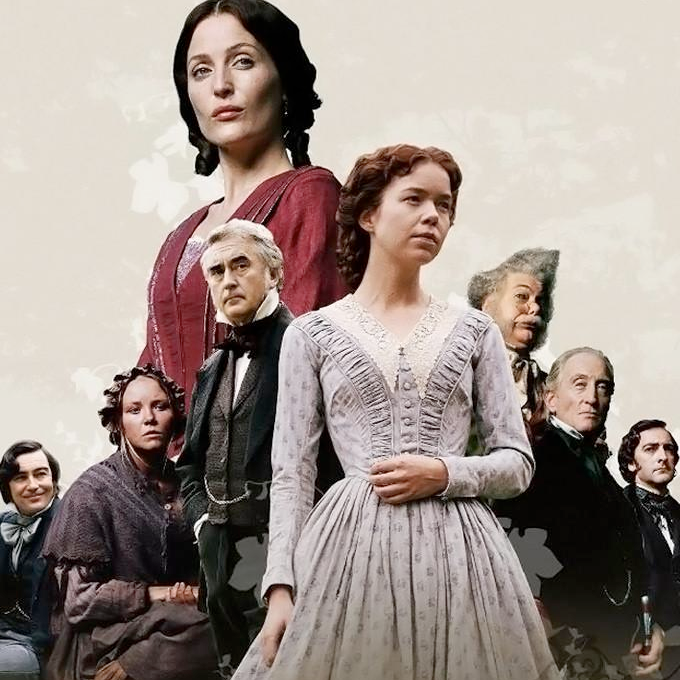
The Characters of Bleak House, BBC, 2005.
An alarming amount of my time as a graphic designer and art director is spent dissuading clients from taking the safe option. This doesn't come from a desire to be radical for the sake of being radical. Instead, it comes from a pragmatic conviction that success in most forms of communication (commercial and non-commercial) is best achieved by crediting audiences with intelligence, and avoiding clichés and formulaic gestures. But this is a hard argument to win. Brave clients are rare; there is security in sameness, and safety in dumbing down. Of course, dumbing down extends beyond the sheltered groves of graphic design: for countless activities, dumbing down is now the default position.
Scanning the cultural landscape for suitable examples to demonstrate that dumbing down is unnecessary, is often fruitless. Good specimens are difficult to find, especially for graphic designers (there are only so many times that you can wave a Dutch design book in front of a client.) Yet a surprise candidate has appeared on the British scene. Who would have guessed that a BBC costume drama would provide us with Exhibit-A in the defense's case —that a mass audience can be engaged without pandering to base instincts?
The BBC's current serialisation of Charles Dickens' Bleak House is a triumphant example of mainstream entertainment that has style and integrity, and is devoid of patronising tones: it's Dickens at his effervescent best — a thousand-page masterpiece of ravishing invention with enough darkness (and macabre horror) to keep James Ellroy fans transfixed, yet sufficient romantic sentiment to melt all but the most stoney-hearted. With unexpected verve, the BBC has taken this epic novel and parsed it into fifteen, twice weekly, half-hour episodes. The £8m ($14m) production is broadcast during prime time on Thursday and Fridays — during peak-viewing slots normally reserved for soap operas, quiz shows and other types of standardised entertainment.
The BBC has a long tradition of producing well-crafted costume dramas. But Bleak House is something entirely different. The scriptwriter Andrew Davies has taken a forensic eye to Dickens' book and distilled it into a series of pared-down, dramatically-charged episodes. His script has been brought vividly to life by two directors, and the art direction brilliantly transforms London into a kind of Victorian-era Blade Runner. The acting is consistently strong, notable for some unexpected casting choices: the X-Files' Gillian Anderson, for example, plays the female lead with impeccable aristocratic hauteur. Dazzling camera work makes the series feel at once dynamic and relevant by contemporary production standards, and the editing uses, to surprisingly good effect, the sorts of fashionable slam cuts more commonly found in music videos. Apart from a lacklustre title sequence (surely some of the budget could have been spent on graphic design?) the production is practically flawless.
Though historically accurate, this is not a snooty, over-precious reworking of Dickens. It's vibrant and engaging, and — like Dickens himself — shamelessly populist. (Many off his novels were published in installments and the author promoted them with frequent public readings.) It is brilliantly scheduled and cleverly promoted, and as a consequence, has grabbed 29% of the UK viewing public.
To a global audience, the fact that the BBC has produced 15 episodes of high-quality costume drama will hardly raise an eyebrow. For most people around the world, the BBC is a paradigm of quality and integrity; indeed, serialisations of such classic novels are precisely what the public has come to expect. Yet for the British TV viewing audience, our sense of the BBC is different. The 'Beeb' still beats most of its commercial rivals for programming excellence and range of content, and we still turn to it instinctively at moments of national crisis. But in recent years, it has become drearily keen to serve up far too much dross for no reason other than to crow about its share of the viewing audience.
But why should the BBC chase ratings? After all, it is owned by the nation and paid for by a levy (the license fee) charged to every UK household that owns a television set. It is a genuine public-service broadcaster. Yet paradoxically, it's the BBC's public sector status that has led to its ratings-obsessed drift toward dumbed-down broadcasting. So great is the fear that a free-market inclined government will revoke the Corporation's charter and cut it adrift to survive in the open market, that the BBC has felt compelled to insure against this eventuality by ratcheting up its viewing figures by whatever means possible.
The UK government is currently reviewing the BBC's charter, and for some observers, the corporation's courageous dramatisation and daring scheduling of Bleak House is a calculated and cynical act of self-preservation. What better way to show the policy-makers that the BBC is still committed to first-rate public service broadcasting than to stage a prime-time dramatisation of one of the classics of English literature?
This may be the case, but it doesn't negate Bleak House's contribution to the dumbing down debate. A more effective rebuttal of the notion that dumbing down is a prerequisite of attracting a mass audience will be hard to find.
